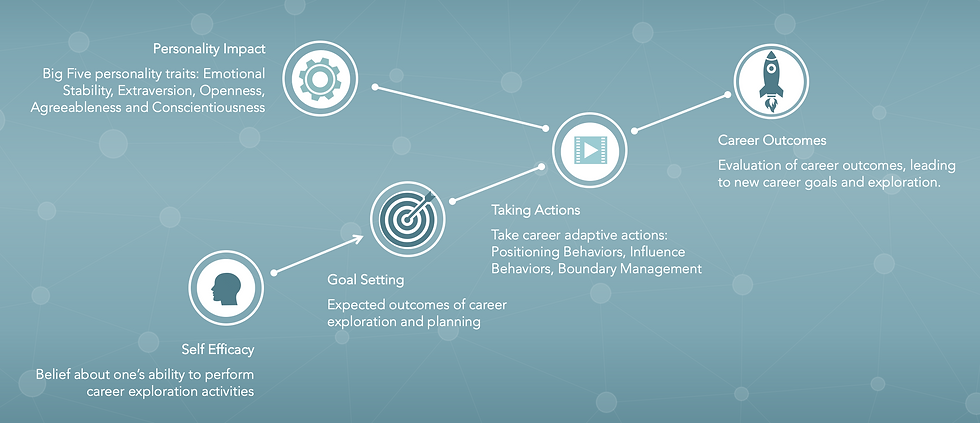Career Self-Management is a model of adaptive behaviors we adopt to influence career decisions in order to attain desired outcomes (read more in our last article). Similar to other behavioral management models, the key to successful self-management is a process of goal setting/planning, taking actions, and evaluation of outcomes.

Amongst the factors that influence the above process, one of the most unique and well-studied factors would be how our personality influences the career self-management process.
Conscientiousness - one of the Big Five traits
Stemming from numerous research on personality, the Big Five personality traits (Emotional Stability, Extraversion, Openness, Agreeableness and Conscientiousness) emerged to be a well supported model explaining personality. Amongst the five traits, conscientiousness was found to be of significant predictive ability on career management behaviors.
Conscientiousness could be described in 3 ways: achievement oriented, dependable, and orderly. People high in conscientiousness tends to be considered cautious, deliberate, disciplined, having a strong will to achieve.
Conscientiousness is found to influence career self-management in several ways. Due to its goal-directed and achievement-oriented nature, it is found to be the trait with the strongest impact on career exploration activities when compared to the Big Five traits. The disciplined and orderly nature encourages more career planning activities, which in turn facilitates adaptive actions. Being achievement oriented and dependable, conscientiousness is a significant predictor of career confidence and self-efficacy.
What can we do about it?
The first step would be to identify whether conscientiousness is your strength or not through the use of measurement tools available in the market. For example, the Hogan Personality Inventory measures Big Five factors, where consciousness is reflected by the Prudence inventory. If Prudence is identified to be your strength, we could work on maximizing the positive impact while carefully managing its dark side (e.g. micromanaging, difficult to be satisfied). If it is not your strength, conscious effort could be invested to boost the behaviors related to conscientiousness, which are beneficial to your career exploration and planning activities.
Our upcoming articles would cover the remaining facets of the Big Five traits and their implications on career self-management.
Project Timeout provides personal coaching service that focuses on the effectiveness of your career. With the help of personality assessment tools, we help you analyze what impacts your career self-management, and what behaviors help you manage your career development.
References
Brown, S.D. & Hirschi, A. (2013). Personality, career development, and occupational attainment. In S.D. Brown & R.W. Lent (Eds.), Career development and counseling: Putting theory and research to work (2nd ed., pp. 299-328). New York, NY: Wiley.
King, Z. (2004). Career self-management: Its nature, causes and consequences. Journal of Vocational Behavior. 65(1), 112-133.
Lent, R.W. & Brown, S.D. (2013). Social Cognitive Model of Career Self-Management: Toward a Unifying View of Adaptive Career Behavior Across the Life Span. Journal of Counseling Psychology. 60(4), 557-568.


Comments